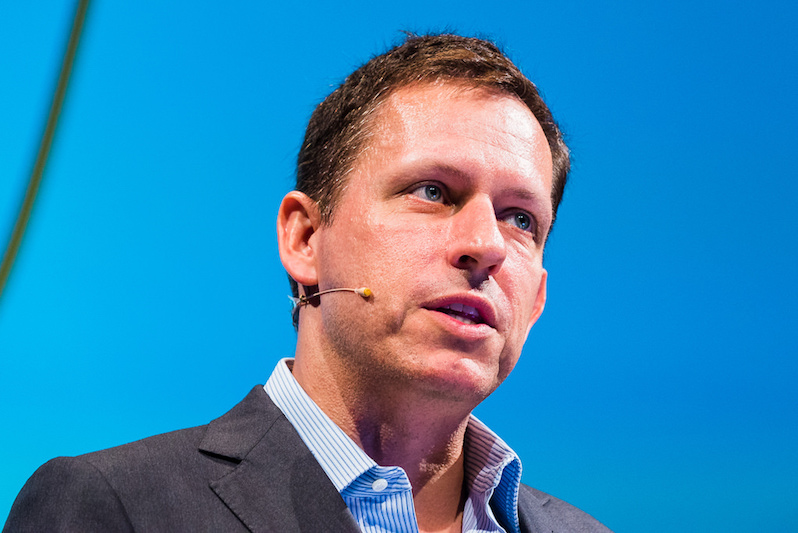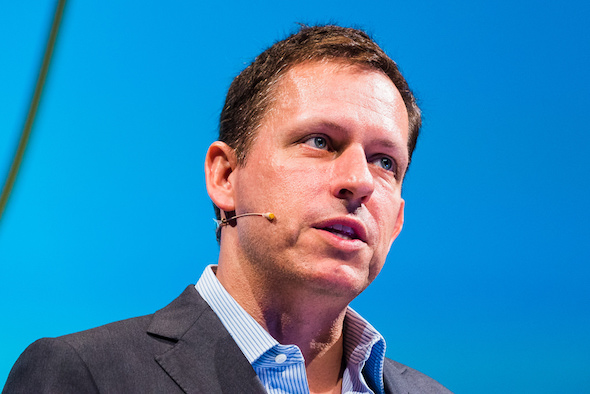Tech Leaders Take Sides in Clash Between Peter Thiel and Gawker Media
Facebook's top brass is on board with Peter Thiel, but Amazon's boss thinks he needs to toughen up.
Facebook’s top brass is on board with Peter Thiel, but Amazon’s boss thinks he needs to toughen up. Meanwhile, tech entrepreneur Thiel, who worked his way into Silicon Valley’s uppermost ranks by co-founding PayPal and Palantir, is throwing big bucks into a controversial side project: taking Gawker Media down.
Here’s Facebook’s publicity-friendly chief operating officer Sheryl Sandberg, of “Lean In” fame, commenting to the BBC on Thiel’s battle at the Code Conference:
“Peter did what he did on his own, not as a Facebook board member,” Ms Sandberg told attendees at the California event.
“We have very independent board members with very independent thoughts that they share publicly. Those strong people make really good board members because they have strong views and they’re not afraid to think differently than other people, which has served Facebook well.”
So, Thiel appears to be keeping his seat on the board of Facebook, the social media platform rapidly taking over the news business.
Meanwhile, Amazon’s Jeff Bezos took a different tack in remarks made Tuesday at the same technology summit Sandberg attended (via The Huffington Post):
“Seek revenge and you should dig two graves, one for yourself,” the Amazon founder said at the Code Conference in Los Angeles Tuesday night, in reference to a quote attributed to Chinese philosopher Confucius.
“The best defense to speech that you don’t like about yourself as a public figure is to develop a thick skin,” he added, stressing that this wasn’t particularly directed at Thiel or any particular story. “If you absolutely can’t tolerate critics, then don’t do anything new or interesting.”
Both sides in the dispute consider the stakes symbolic, as well as higher than they may appear at first glance.
READ: Gawker’s Founder Has Doubts About the Facebook Model of Journalism
By way of some background, Gawker Media chief Nick Denton has counted the New York-centric media blog Gawker, as well as Jezebel, Gizmodo, Deadspin and the now-defunct Valleywag and Defamer among the sites in his digital media domain. Valleywag, which focused on tech industry news and gossip, fired the first salvo by outing Thiel as gay back in 2007, in what would become the Denton-Thiel showdown (via The New York Times):
A 2007 article published by Gawker’s Valleywag blog was headlined, “Peter Thiel is totally gay, people.” That and a series of articles about his friends and others that he said “ruined people’s lives for no reason” drove Mr. Thiel to mount a clandestine war against Gawker. He funded a team of lawyers to find and help “victims” of the company’s coverage mount cases against Gawker.
“It’s less about revenge and more about specific deterrence,” he said on Wednesday in his first interview since his identity was revealed. “I saw Gawker pioneer a unique and incredibly damaging way of getting attention by bullying people even when there was no connection with the public interest.”
Mr. Thiel said that Gawker published articles that were “very painful and paralyzing for people who were targeted.” He said, “I thought it was worth fighting back.”
Interestingly, Thiel could be said to be “pioneering” his own unique way of getting back at Gawker by funding cases other than his own filed against the media company. His first payback opportunity, now nine years after the initial insult, took the form of an ongoing lawsuit filed by professional wrestler Hulk Hogan (née Terry Bollea) against Gawker for publishing a story, including video footage, in 2012 about a sexual encounter Bollea had in 2006 with a friend’s spouse. In short, Thiel was secretly writing checks to help cover Bollea’s legal fees.
Since news broke last month that Thiel was working behind the scenes on Bollea’s court case, Denton hasn’t exactly backed down, despite the fact that a jury ruled in Bollea’s favor in March and ordered Gawker to pay the wrestler $140 million. Take, for example, this “Open Letter to Peter Thiel” composed by Denton and posted May 26 on Gawker (excerpted in part below):
I can see how irritating Gawker would be to you and other figures in the technology industry. For Silicon Valley, the media spotlight is a relatively recent phenomenon. Most executives and venture capitalists are accustomed to dealing with acquiescent trade journalists and a dazzled mainstream media, who will typically play along with embargoes, join in enthusiasm for new products, and hew to the authorized version of a story. They do not have the sophistication, and the thicker skins, of public figures in other older power centers such as New York, Los Angeles and Washington, D.C.
And I can see how tempting it would be to use Silicon Valley’s most abundant resource, a vast fortune, against the harsh words of the writers of a small New York media company. We have our devices; you have yours.
Among the million posts published by Gawker and other properties since the company was founded, there have undoubtedly been occasions we overstepped the line. In offsetting the fawning coverage of tech luminaries and others, sometimes our stories swing too far for my taste toward snark.
But this vindictive decade-long campaign is quite out of proportion to the hurt you claim. Your plaintiff’s lawyer, Charles Harder, has sued not just the company, but individual journalists.
A.J. Daulerio, author of the 2012 story on Hulk Hogan, is out of work and unable to pay the $100,000 in punitive damages awarded by the jury. In the Ayyadurai and Terrill complaints, Harder cynically paints author Sam Biddle as an abuser of narcotics, basing this claim on Biddle’s own writing about his struggle with anxiety and depression, and the physician-prescribed medication he takes to treat his mood disorders. John Cook, our executive editor, is accused of negligent hiring and retention.
Peter, this is twisted. Even were you to succeed in bankrupting Gawker Media, the writers you dislike, and me, just think what it will mean.
The world is already uncomfortable with the unaccountable power of the billionaire class, the accumulation of wealth in Silicon Valley, and technology’s influence over the media.
You are a board member of Facebook, which is under congressional investigation after our site Gizmodo reported on the opaque and potentially biased way it decides what news sources are seen by its billions of users.
Now you show yourself as a thin-skinned billionaire who, despite all the success and public recognition that a person could dream of, seethes over criticism and plots behind the scenes to tie up his opponents in litigation he can afford better than they.
You were the basis for the affectless venture capitalist in the HBO show, Silicon Valley; with this diabolical decade-long scheme for revenge, you are redefining yourself as a comic-book villain.
This story will play out in the press and the courts. Both are adversarial forums, in which each side selects facts and quotes to undermine the reputation and credibility of the other. We are confident of our arguments on the newsworthiness of our Hogan story, once it reaches the appeals court. Your main proxy, Hulk Hogan, has his.
We, and those you have sent into battle against us, have been stripped naked, our texts, online chats and finances revealed through the press and the courts; in the next phase, you too will be subject to a dose of transparency. However philanthropic your intention, and careful the planning, the details of your involvement will be gruesome.
I’m going to suggest an alternative approach. The best regulation for speech, in a free society, is more speech. We each claim to respect independent journalism, and liberty. We each have criticisms of the other’s methods and objectives. Now you have revealed yourself, let us have an open and public debate.
So, beyond the minutiae of the cases in question, the issue comes down to free speech versus privacy in the internet age—or even, for Gawker’s sympathizers, the ability of news organizations to act as checks on power, as enshrined in the ideal of the Fourth Estate. Gawker is appealing the March court ruling and considers Thiel’s power move on Bollea’s behalf to be a form of censorship masquerading as philanthropy.
Another significant detail in this saga is that Palantir is the CIA’s go-to data-mining company and was initially funded in part by the intelligence agency. Here’s a quick summary from Bloomberg Technology:
Palantir was co-founded by Peter Thiel, the venture capitalist known for backing Facebook Inc. and co-founding PayPal Holdings Inc., who initially funded the firm before winning an investment from In-Q-Tel Inc., the investment arm of the CIA. It was valued at $20 billion in a funding round in 2015, people familiar with the matter said at the time. That compares to a market capitalization of about $29 billion for Credit Suisse.
In April 2010, security researchers in Canada used Palantir’s software to crack a spy operation dubbed Shadow Network that had broken into the Indian Defense Ministry and infiltrated the Dalai Lama’s e-mail account.
Palantir builds software that ties databases together to make it easier to search for and analyze information, and its clients include police and intelligence services.
Despite the big guns taking aim at his business, Denton expressed optimism, in a BBC interview published Friday, about his company’s ability to endure Thiel and Bollea’s legal offensive and win in an appeal.
Mr Denton said the 2007 Gawker article was not the only reason Mr Thiel disliked the media.
“My guess is that he has been more upset by the mockery of his political views,” he told the BBC. “He is a supporter of Donald Trump, he is a libertarian, he resists the interference by terrestrial governments.”
Mr Thiel was among the “most extreme” of tech luminaries, Mr Denton said.
Asked about the $140m judgement against Gawker, he said: “I’m confident that when this case comes before judges in a higher court that people will find again there is a place for critical journalism and it deserves to be protected.
Finally, Gawker and Denton were also defended Tuesday by an unlikely source of support: writer Stephen Marche, who has himself been the subject of not-infrequent assaults by Denton’s cadre of journalists. Marche spoke up in a New York Times article that made his history with Gawker quite clear, starting with the headline: “Gawker Smeared Me, and Yet I Stand With It”:
Gawker is new media, but it possesses an old-fashioned sensibility that dates from the 18th century. The editors and writers want power to be made uncomfortable whether or not it deserves the discomfort, and they believe that the public right to information is more important than any individual’s right to privacy. I would say, to anyone who believes that Gawker is just the gutter press, that those values are worth something even in the gutter.
The distaste Gawker provokes is largely a result of the world it inhabits and reflects. Gawker is responding to an asymmetry of celebrity power, and the way that celebrities like Bill Cosby, Jimmy Savile, Jian Ghomeshi and Woody Allen, to name a few, become immune to the pressures of civil society.
Whether Gawker should have posted the Hulk Hogan sex tape I will leave to the care of finer souls than mine. I will say this: No one could possibly object if that were the tape of a congressman. But even a pathetic D-lister like Hulk Hogan has more power to shape the world today than most congressmen. The world we live in has made a presidential nominee out of a reality television star. This is the world that Gawker predicted and took up arms against.
In that respect, by now it’s abundantly clear that Gawker was onto something.
–Posted by Kasia Anderson
Your support matters…Independent journalism is under threat and overshadowed by heavily funded mainstream media.
You can help level the playing field. Become a member.
Your tax-deductible contribution keeps us digging beneath the headlines to give you thought-provoking, investigative reporting and analysis that unearths what's really happening- without compromise.
Give today to support our courageous, independent journalists.







You need to be a supporter to comment.
There are currently no responses to this article.
Be the first to respond.